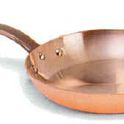how to make a perfect spaghetti
8 Comments
Meatballs&MilkshakesMarch 6, 2012
Always cook pasta in very salty water- it should taste like the sea. Also, take it out a minute before the package instructions say and toss in your sauce for the final minute. Fantastic restaurant quality pasta every time.
sfmillerMarch 6, 2012
I had always cooked pasta in copious amounts of water without much thinking about it (it's just the way it's done!) until I tried the method advocated by Harold McGee that uses a skillet and just a small amount of water..
It saves time (and water and energy) and I can't tell the difference in the quality of the cooked pasta.
Has anyone else tried this? Here's McGee
http://www.nytimes.com...
http://www.youtube.com...
It saves time (and water and energy) and I can't tell the difference in the quality of the cooked pasta.
Has anyone else tried this? Here's McGee
http://www.nytimes.com...
http://www.youtube.com...
Mr_VittlesMarch 6, 2012
Yes. It works fantastically. Just as good as using 4 quarts.
Mr_VittlesMarch 5, 2012
I recommend De Cecco because its widely available (I.e. Walmart) and tastes great. A lot of places even in Italy use it. I find the most important rule in making great noodles is to use a lot of salt. It makes the noodles taste a lot better. Some people have already mentioned copious amounts of water, in my experience I have found this to be true, but if you are willing to sit next to the boiling water and stir constantly, not vigorously, but every 30 seconds or so, you can get away with using less water. Also, allowing the water to come to a rolling boil is often brought up in regards to this subject but I have found in my experience that not to be the case, the tradeoff is that it can take a bit longer to cook.
allansMarch 5, 2012
I find the only way is to taste it. The brands all cook so differently. Also, read the label. I only choose pasta made with the minimal ingredients. Usually semolina, egg, water and salt. No enriching for me!
sstiavettiMarch 5, 2012
First, use enough water to effectively cook the noodles without them congealing: a good rule is 1 quart of water for every 1/4–pound of pasta. Another thing you need to remember is to salt your cooking water: 1 tablespoon of salt for every 2 quarts of water. Salt brings out the flavor in your pasta (I avoid iodized salt. Use sea salt instead).
Also, never add oil to your water. Your lovely sauce will slip right off - you want your pasta starchy to give the sauce something to adhere to.
And +1 on the Rustichella d'Abruzzo.
Also, never add oil to your water. Your lovely sauce will slip right off - you want your pasta starchy to give the sauce something to adhere to.
And +1 on the Rustichella d'Abruzzo.
pierinoMarch 5, 2012
If it's carbonara you don't want penne anyway. You must lift it out and taste if it's al dente. 90% of the restaurants in Italy use manufactured pastas; most don't make it in the house. The best brand is Rustichella d'Abruzzo. Old fashioned and somewhat tough because it's extruded through bronze dies. Barilla is a popular brand but if you read the label the stuff that sells in supermarkets here in the USA is made here in the USA.
Now to the original poster, do you want make spaghetti by hand from scratch?
Now to the original poster, do you want make spaghetti by hand from scratch?
bigpanMarch 5, 2012
Read the package instructions for timing. Each brand uses different grains and a different grind. They test and test and that is why one penne will say 8 minutes while anther will say 10 minutes. Use more water than you think and do -not- rinse after. I am speaking of Italian pastas, not Kraft, et al.
Showing 8 out of 8 Comments
Recommended by Food52
Popular on Food52
Continue After Advertisement





